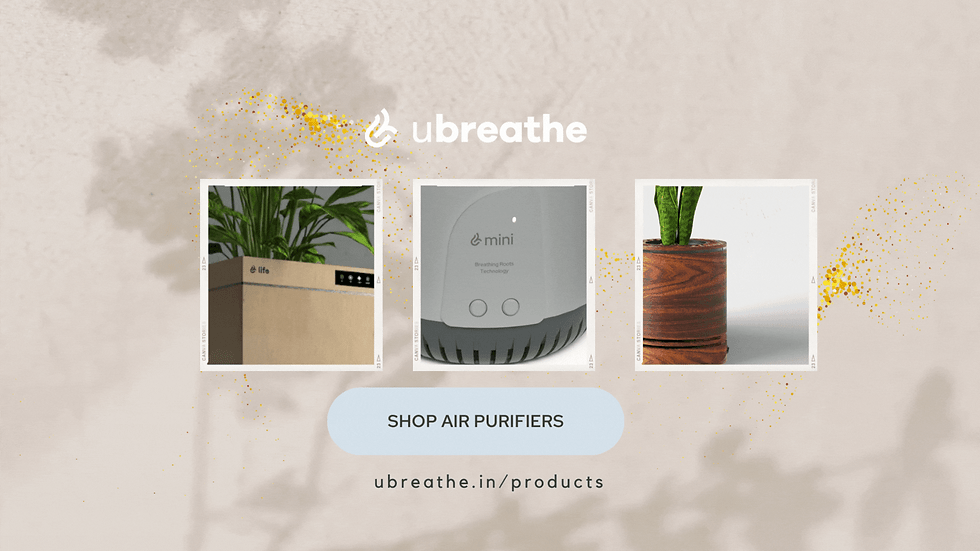Is Your Indoor Air Making You Sick? Invest in uBreathe for Lasting Health Protection
- uBreathe

- Aug 11, 2025
- 3 min read
When we discuss pollution, we typically envision traffic, smoggy skies, or factory fumes. However, what if I told you that the air within your home could affect your health just as much—or even more—than the air outside? Let's delve into how indoor air pollution infiltrates our everyday lives and why it's important to be aware of it.

According to the Environmental Protection Agency (EPA), the air inside homes and buildings can be two to five times more polluted than outdoor air, and sometimes, it can reach levels up to 100 times more polluted.
Why is Indoor Air Pollution a Big Deal?
Imagine this: You spend around 90% of your time indoors—at home, in the office, or even at the gym. It’s natural to think these spaces are safe. But indoor spaces can harbor a range of pollutants: dust, pet dander, smoke, mold, and even volatile organic compounds (VOCs) released by household cleaners, furniture, and building materials. Unlike outdoor air, which gets dispersed, indoor pollutants can linger and build up over time. This makes the air we breathe inside four to five times more polluted than what’s outside, according to the Environmental Protection Agency (EPA).

The Long-Term Health Effects of Indoor Air Pollution
1. Respiratory Issues That Stick Around
Chronic exposure to indoor pollutants can significantly affect your respiratory health. Over time, this can cause problems like:
Persistent cough and sore throat – ever noticed these symptoms but can’t quite pinpoint the cause? Indoor allergens might be the culprit.
Asthma development or worsening – even people without asthma can develop it if exposed to indoor pollution long enough.
Chronic bronchitis – prolonged inhalation of irritants like smoke and VOCs can lead to long-term inflammation in your airways.
2. Impact on Cardiovascular Health
Indoor air pollution doesn’t just affect your lungs; it impacts your heart as well. Studies have shown that long-term exposure to pollutants like PM 2.5 (small particulate matter that’s easily inhaled) can increase the risk of heart diseases, high blood pressure, and even stroke. This is because pollutants can cause inflammation, affecting blood vessels and overall heart function. In the long run, this isn’t something to take lightly!

3. Worsening of Skin Health
Indoor pollution can harm your skin in surprising ways. Pollutants like VOCs and ozone are known to break down collagen and elastin, which keeps your skin firm and youthful. Long-term exposure can lead to dullness, premature aging, dryness, and even conditions like eczema. So, if you’ve been wondering why your skin feels off lately, it might just be the air inside your home.
4. Neurological and Cognitive Decline
Research is beginning to reveal that air pollution doesn’t stop at physical health; it affects mental health too. Chronic exposure to indoor air pollutants, especially fine particles like PM 2.5, has been linked to a higher risk of cognitive issues, including memory decline and even Alzheimer’s disease. Long-term exposure has been associated with mental health effects such as anxiety, depression, and poor sleep, which can, in turn, impact productivity and quality of life.
5. Increased Allergy and Asthma Symptoms
Long-term exposure to dust, mold spores, pet dander, and pollen indoors can increase sensitivity and lead to chronic allergy symptoms—sneezing, itchy eyes, and runny nose. Over time, these irritants can weaken your immune system, making you more vulnerable to colds and other infections.
Why uBreathe is a Long-Term Investment for Your Health?

uBreathe air purifiers combine bio-filtration and UV disinfection to break down pollutants, providing long-lasting clean air without frequent filter replacements. With real-time monitoring via an IoT-enabled app, you can check indoor air quality and control the purifier remotely. Plus, its eco-friendly, recyclable design ensures sustainability, making uBreathe a smart, low-maintenance choice for a healthier home environment.
Indoor air pollution is an invisible but real health threat that accumulates over time. By understanding its effects and taking preventive actions, you can protect yourself and your loved ones. When it comes to your health, it’s always worth it to make sure that every breath you take is a clean one!
uBreathe is an organization that focuses on Air wellness systems and Plant-based Air cleaners designed for your space, supported by the goodness of nature & the power of technology. It was empowering businesses to be more sustainable with improved air quality that is sustained through our air-wellness systems.
BY DEBOPRIYA CHANDRA


Comments